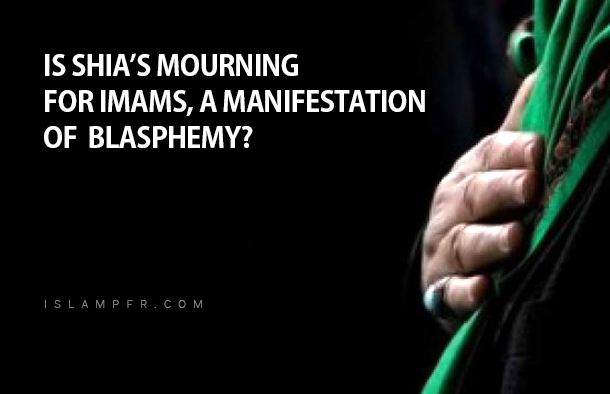Question:
Is Shia’s mourning for Imams, a manifestation of blasphemy?
Answer:
Wahhabis view any kind of mournful ceremony and dirge for the Friends of Allah and even the household of Prophet Muhammad (Ahl-al-Bayt) as a manifestation of blasphemy and heresy and forbid it.
They have a false delusion that holding mournful ceremonies is an act which has never existed in the history of Islam or at the time of companions of Prophet Muhammad (PBUH) or early Islamic era and it has been contemporaneously initiated by some of the Muslims.
Following this corrupted belief, they even proclaim mourning for Imam Hussein (PBUH) in the day of Ashura to be a heresy, and not only do they refrain to mourn on this day for the grandson of the Prophet, but they even announce the day as the day of festivity and happiness and call on others to celebrate on this day. Similar fashion initiated by the Umayyad Dynasty after the martyrdom of Imam Hussein on the day of Ashura, and now their true descendants – the Wahhabis– are following their path:
… [Oh Aba Abdullah!] This is a day on which the sons of Ummaya and the son of liver-eater – the damned son of the damned – celebrated …
Although Wahhabism, introduces itself as a part of Sunni sect and Wahhabis call themselves as the followers of Ahmad ibn Hanbal; but we should have a look on the opinions of Sunni Muslims about mourning for Aba Abdullah and holding mournful rituals for him in the day of Ashura to show the contradictions between Wahhabism and Sunni Muslims.
Ibn Kathir writes down in his book, “The beginning and the end”:
“At the time of Nasser (Governor of Aleppo), people asked for the passions of Karbala to be recited for them. Sibt ibn al-Jawzi ascended the pulpit and remained silent for a long time, then he took off his turban and started to cry and recited the following poems:
ویل لمن شفعاؤه خصماء والصور فی نشر الخلائق ینفخ
لا بد ان ترد القیامه فاطم و قمیصها بدم الحسین ملطخ
Translation:
Woe to the people whose intercessors become their claimant in the doomsday, when the trumpet is blown.
It is inevitable that Fatima (PBUH) shall enter the scene of doomsday while carrying the garment of his son, Hussein (PBUH), covered in blood
Then he descended the pulpit and left for his house while crying… (1)”
It was fashionable among Sunni people to hold mourning ceremonies for their dead, as it is written down by Zahabi about the death of Juwayni (D. 1099):
“The markets were closed down and some dirges were song. He had four hundred disciples who mourned for a year and never put their turbans on for a year. The disciples were marching in the city in groups while reading dirges and mourning loudly for their master. (2)”
And it is written down about the funeral of Abdulmu’min (D. 967):
“The sound of drums were heard in every corner, – like what is performed in the armies – and funeral marches were so loud that we thought an army was invading. (3)”
It is written down about the death of ibn Jawzi (born in 1218):
They stayed beside his grave for all the month of Ramadan, and recited the Quran several times, and brought candles and cressets. “Saturday morning we held mourning ceremonies, preachers preached and many people participated and dirges were song.” (4)
It should be noted that Wahhabis try to separate Shias from Sunni people and shall gradually confront all Shia and Sunni sects one by one. The Sunni scholars don’t agree with Wahhabism, and even confront them and excommunicate the founders of this sect.
References:
1- The beginning and the end, Vol. 13, p 207.
2- The lives of the noble figures, Vol. 8, p 468.
3- The lives of noble figures, Vol. 15, p481.
4- The lives of noble figures, Vol. 18, p379.
